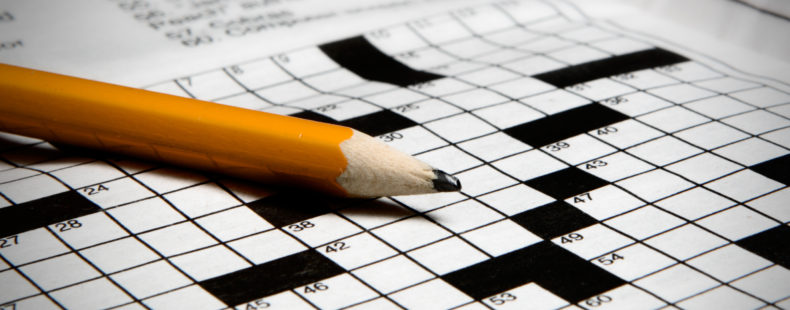Here is the final installment of our interview with Will Shortz, the editor of the New York Times’ Crossword Puzzle and NPR’s Puzzlemaster. Find out his favorite crossword word and why English is the best language to make crosswords in.
Dictionary.com: What are your general ideas about the relationship between language and crosswords?
Will Shortz: The English language may be the best language in the world to write puzzles in because, first of all, we have a huge vocabulary. Second, we often have many synonyms, many ways to express an idea. Another cool thing about English is the number of idioms. Then one of the great things is how spelling and pronunciation often don’t go together, so there are many ways to write clues that involve word play that are satisfying that you wouldn’t be able to do in other languages.
D: So what do the best clues do? How do they operate on a semantic level?
WS: Well, a clue and its answers must be in the same part of speech and mean roughly the same thing. Usually the test on that is that you should be able to interchange a clue and its answer in a sentence and have the same meaning. That’s the basic rule. There are rare exceptions, but that’s basically it.
D: You’ve said before that you try to avoid crosswordese. What exactly is that? And why exactly have you decided to avoid it?
WS: Crosswordese are the words that usually are from the depths of the unabridged dictionary that are very useful to crossword makers because they’re short and they’re full of vowels, but are rarely seen in everyday life. Classic examples are esne, which is an Anglo-Saxon slave, or anoa, it’s a Celebese ox from the Island of Celebes in Indonesia. Those two words, for example, used to appear in crosswords all the time. You could hardly go a week in the New York Times crossword without seeing one or both of those. Nowadays you almost never see them. Those are desperation-only answers because they’re not part of life. You know, crosswords should reflect life and the way people speak. It’s off-putting to encounter words that you don’t know and you don’t think have any purpose in your life. It’s not bad every once in a while to learn an unusual word; I like that. That’s part of crosswords. That’s part of their appeal. But it’s no fun to have words thrown at you that just feel stupid.
D: Qs are pretty rare in crosswords in general because then they have to relate to so many other letters around them.

Will Shortz (Photo by Anthony Loew)
WS: Well, every letter in an American crossword has to cross another word in the other direction. That’s one of the rules of our crossword, not true of English crosswords, but that’s the rule in the United States, every letter has to appear both in a cross word and a down word. So if you have q in one word, it has to appear twice. Every once in a while, let’s say, I have the answer ano. It’s usually clued as “Spanish year.” That’s the basic meaning, but in Spanish it has a tilde and sometimes Spanish-speakers complain that the word año in our crosswords doesn’t have a tilde as it’s supposed to. I just say, the convention in American crosswords is that we don’t worry with accents and other diacritical marks. If you think about it, it would be really hard—you’d never be able to use ano if you have to cross it with another ñ with a tilde.
D: I think that speaks to an interesting balance that you have to strike between the audience’s demand and the exigencies of a great puzzle, which can often butt heads.
WS: Yes, they do. There are at least four daily blogs about the New York Times crossword. I read three of them, and people are always criticizing the obscure words that appear in them and they’re really not that obscure, if you compare the words in the crosswords today to what they were thirty years ago. There’s much more obscurity in the old days. But, that said, there is still a little obscurity that comes in because it’s just really hard to avoid. It’s often impossible to avoid.
D: What are some of the all time best words you’ve ever seen or used in a crossword puzzle?
WS: Wow—ha. Okay, let me think about that. I particularly like phrases, rather than words, but I like words that have unusual letter combinations, like kumquat. Kumquat has appeared twice in the Times crossword, and there’s a reason that it’s appeared only twice even though everyone knows it. It’s because the letter combination is so bizarre that it’s difficult to incorporate in a construction. I like words that are familiar to everybody, but that have unusual letters of the alphabet and that haven’t appeared often in crosswords.
D: Other than table tennis, what are your hobbies? Are you an avid reader?
WS: I read a lot. Not so much books, but I’m online all the time. I read magazines, go to movies, travel a lot. Those are my big things besides table tennis.
***
Do you ever have trouble with crosswords? Try our crossword solver here!
***
Read the first installment of our interview with Will Shortz.












